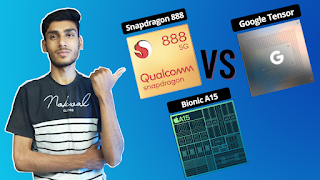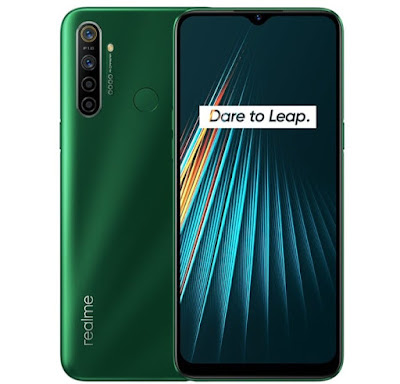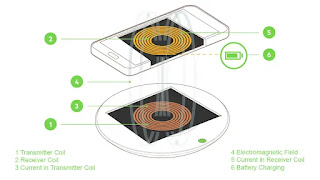Google Tensor Vs Qualcomm Snapdragon 888 Vs Apple’s A15 Bionic
Google Tensor Vs Qualcomm Snapdragon 888 Vs Apple’s A15 Bionic
Google Pixel 6 Series comes with a custom SoC designed
by Google named “Tensor”, well talking about this flagship chipset it can
perform all the High and Multi-level tasks; But could it beat the Snapdragon
888 and A15 Bionic?
Let’s throw some light on the Key Points of all the
three major chipsets.
CPU Performance
Google Tensor: Octa-Core CPU: 2 x 2.8GHz
(Cortex-X1) Performance cores and 4 x 1.8GHz (Cortex A55) Power Efficiency
cores.
Snapdragon 888: Kryo
680, Octa-Core CPU: 1 x
2.8GHz (Cortex-X1) Performance cores, 3 x 2.4GHz (Cortex A78) cores and 4 x
1.8GHz (Cortex A55) Power Efficiency cores.
Bionic A15: Hexa Core CPU: 2 x 3.2GHz
(Avalanche) High Performance cores and 4 x 1.82GHz (Blizzard) Power Efficiency
cores.
Google
Tensor uses a “Heterogenous computing” for multiple processors to work simultaneously
in order to deliver a sustained performance with least battery consumption.
The reason why Google
Tensor uses old A76 core instead of new A78 cores is to offer 20% more
sustained performance, less heat and high battery life.
Process Technology
Google Tensor: Samsung’s 5nm Process Technology
Snapdragon 888: Samsung’s 5nm Process Technology
Bionic A15: TSMC’s 2nd Generation 5nm
Process Technology
GPU Performance and Benchmarks
Google Tensor: 20-core
Mali G78 GPU (1000
single-core score)
Snapdragon 888: Adreno 660 GPU (1100 single-core
score)
Bionic A15: Five Core GPU Designed by Apple
(1700 single-core score)
Google
Tensor offers very smooth task performance and is one step ahead in comparison
to Snapdragon 888’s Adreno 660 GPU because of 20-core Mali G78 GPU.
In Android
world Tensor definitely wins but not with A15 Bionic, gives a hard competition
to Bionic A15.
AI (Artificial Intelligence) and
Machine Learning
Google Tensor: Google
Custom TPU (Tensor Processing Unit)
Snapdragon 888: 6th Generation AI
Accelerator
Bionic A15: 16-core Neural Engine
The main reason for Google to make their own custom
chip was to deliver more sustained performance, good user experience, timely
updates, a good computation with hardware and to do AI Tasks more effectively
so that they can provide the best user experience in their devices.
No Doubt, Tensor meets all the requirements for Google
and they developed a chipset which is very efficient in doing all the AI and
Machine Learning Tasks.
ISP (Image Signal Processor)
Google Tensor: Google
Custom ISP
Snapdragon 888: Spectra 580
Bionic A15: New Image Signal Processing by Apple
Google Tensor can shoot HDR videos at 4K @60fps with
computational photography and can take sharp photos Google call it “Motion Mode”
because of good AI used.
Snapdragon 888 can shoot concurrent streams from three
cameras upto 200MP and record in 8K @30fps.
Bionic A15 works very well can record HDR Dolby Vision
videos in 4K @60fps.
Connectivity (Modem, Bluetooth and
Wi-Fi)
Google Tensor: Samsung
Exynos 5123 Modem (7.3Gbps Peak Download and 3.6Gbps Peak Upload Speed), Wi-Fi
6E and Bluetooth v5.2.
Snapdragon 888: Qualcomm
X60 5G Modem (7.5Gbps Peak Download and 3Gbps Peak Upload Speed), Wi-Fi 6E
Ready and Bluetooth v5.2.
Bionic A15: Qualcomm
X60 5G Modem (7.5Gbps Peak Download and 3Gbps Peak Upload Speed), Wi-Fi 6E
Ready and Bluetooth v5.0.
All three
chipset support mm (millimeter) Wave and sub-6GHz 5G.
Conclusion: Who wins?
Apple Bionic A15 is superior in performance.
Google Tensor has very good computing capabilities and
is very promising. Mainly focused on providing a good user experience rather
than raw performance, Tensor has best Al learning and uses full hardware effectively
for providing best user experience.
Well that’s about it all chipsets hold a major place
in their working.
What are your
thoughts about these SoCs, which one is your favourite among these?









Comments
Post a Comment